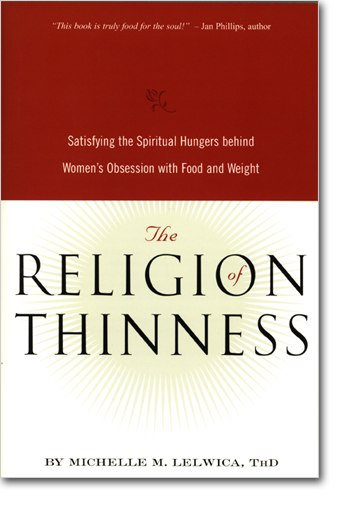
The Religion of Thinness
Satisfying the Spiritual Hungers behind Women's Obsession with Food and Weight
by Michelle M. Lelwica, Th.D.
The Religion of Thinness
How Society’s Obsession with Beautiful Bodies is Holding Us Captive
Moorhead, Minnesota – According to the National Eating Disorders Association, Americans spend approximately $60 billion a year on weight loss products, and diet books outsell any other books on the market—except the Bible. An estimated 10 million women and 1 million men suffer from eating disorders, and many millions more struggle with their weight. Obsessing about eating and weight has come to function like a religion, complete with its own moral code, symbols, beliefs, rituals and rules. At the heart of this obsession is the belief that in order to be happy, one must be slim.
In her revolutionary new book, The Religion of Thinness: Satisfying the Spiritual Hungers behind Women’s Obsession with Food and Weight, Michelle Lelwica, Th.D. challenges our culture’s devotion to slenderness and encourages readers to identify the spiritual needs that are hidden behind their desire to be thinner. Having had personal experience with an eating disorder herself, (she suffered from bulimia as a teenager), she explores a variety of more nourishing ways to meet these needs.
Lelwica proposes that the never-ending quest for a fat-free body masks deeper yearnings for a sense of purpose that religions are typically meant to provide. Even as the influence of traditional religions has been challenged, she shows how The Religion of Thinness is flourishing among devotees who chronically diet, exercise compulsively, go under the knife, or suffer with eating disorders like anorexia, bulimia, or binge eating.
“The real problem is not our soft bellies or well-rounded buttocks,” stresses Lelwica. “We crave much more than food, which is why some of us feel we can never get enough.”
The Religion of Thinness is designed to wake us up—not only to our spiritual longings but also to the ways we have been brainwashed into believing that our bodies are flawed and our appetites sinful. Using examples from the world’s major religions, it examines the widespread cultural messages that contribute to the alienation so many women feel towards their bodies, and it urges criticism of these messages.
In an effort to deliver true redemption from one of society’s most oppressive commandments, “You can never be too thin,” Lelwica hopes her book will help stop the cycle of guilt and shame associated with food, and inspire the millions who are desperately trying to lose weight to discover the sacred longings behind this struggle and “practice peace” with their bodies—as they are.